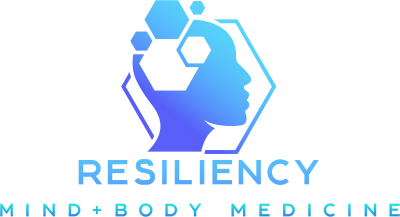At Resiliency Mind+Body Medicine, we’re excited to share the groundbreaking benefits of Omega-3 fatty acids on mental health! Did you know that these essential fats play a crucial role in brain function and can contribute to improved mood and cognitive function?
Why are Omega-3s Important?
Omega-3s are known for their anti-inflammatory properties, promoting a healthy brain and reducing symptoms of anxiety and depression. Research suggests that a balanced intake of EPA and DHA can be a game-changer for your mental wellbeing!
- Brain Boost: Omega-3s, specifically EPA and DHA, are like superfood for your brain! They support cognitive function, improve memory, and contribute to overall mental sharpness.
- Mood Management: These essential fatty acids play a key role in regulating mood and emotions. Omega-3 supplementation has been linked to reduced symptoms of anxiety and depression, helping you find your mental balance.
- Anti-Inflammatory Power: Omega-3s are natural anti-inflammatories, supporting a healthy response to inflammation in the body. This can lead to better joint health and decreased risk of chronic diseases.
- Heart Health: Omega-3s help lower triglycerides, reduce blood pressure, and promote a healthier heart. This provides a boost your cardiovascular well-being and can help promote healthy aging.
- Vision Support: DHA, a type of Omega-3, is a major component of the eye’s retina. Supplementing with Omega-3s may contribute to maintaining good eyesight and reducing the risk of age-related macular degeneration.
Why does Omega-3 Deficiency Happen?
- Dietary Choices: Many people don’t consume enough omega-3-rich foods, such as fatty fish (salmon, mackerel, sardines), flaxseeds, chia seeds, and walnuts. If these foods are not a regular part of the diet, it can lead to an omega-3 deficiency. Supplements of fish oil or algae-based supplements can help boost levels.
- Limited Fish, Nuts, Flaxseed, Algae Consumption: Fatty fish is just one of the primary sources of omega-3s. If individuals don’t consume sources of Omega-3 regularly, they may miss out on these essential fatty acids.
- Cooking and Processing Methods: Certain cooking methods, such as frying, can destroy omega-3 fatty acids. Additionally, the processing of food may remove or reduce the omega-3 content.
- Bioavailability Issues: The conversion of ALA (alpha-linolenic acid) to the more bioavailable forms, EPA (eicosapentaenoic acid) and DHA (docosahexaenoic acid), is not very efficient in the body. Therefore, even if individuals consume ALA, they may not be getting enough of the beneficial forms of omega-3s.
- Health Conditions: Certain health conditions or medications may interfere with the absorption or utilization of omega-3 fatty acids, leading to deficiencies. Conditions affecting the liver, pancreas, or the gastrointestinal tract can be particularly relevant.
- Age: As people age, their ability to convert ALA to DHA and EPA may decrease, potentially increasing the risk of omega-3 deficiency.
It’s important to note that maintaining a well-balanced diet and incorporating omega-3-rich foods or supplements can help prevent deficiencies and support overall health. If someone suspects a deficiency or has specific dietary restrictions, consulting with one of our healthcare professionals at Resiliency Mind+Body Medicine is recommended for personalized advice.
Expert-Designed Supplements by Dr. LaFrenierre
We are thrilled to announce that our very own psychiatrist and addiction specialist, Dr. LaFrenierre, has developed a line of high-quality, non-GMO supplements tailored for your mental health! With her expertise, we’re dedicated to providing you with a natural, science-backed way to enhance overall health and wellbeing.
Learn More: Supplements
Ready to embark on a journey towards improved mental health? Join us in prioritizing your wellbeing!
Call Us: 949-806-6901
Email Us: INFO@ResiliencyMBMedicine.com

